Twenty-fourteen was a great year for games and, as you will soon see, an amazing year for dice games! Given my abysmal luck, I shouldn’t enjoy these types of games, but apparently I did. Don’t worry, I found a couple of non-dice gems to enjoy as well! Here they are:
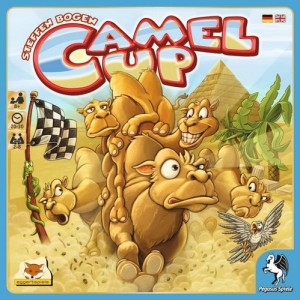 5. Camel Up
5. Camel Up
There isn’t much I can say about Camel Up that hasn’t already been said here, but it is a perfect family game. It won the 2014 Spiel de Jahres for a reason. Betting on a wacky, out-of-control camel race seems to be universally appealing. Who doesn’t enjoy rooting for the underdog, er…undercamel? Any game that can inspire players to hoot and holler at stacking wood pieces gets a thumbs up in my book! Don’t forget to check out our full Camel Up review.
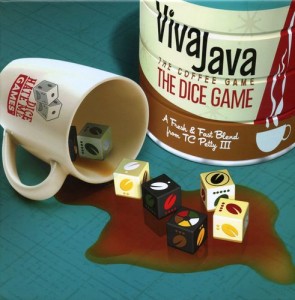 4. Vivajava: The Coffee Game: The Dice Game
4. Vivajava: The Coffee Game: The Dice Game
You could call Vivajava Dice the thinking man’s King of Tokyo. It is push your luck/king of the hill, but there are many more interesting and sometimes subtle choices to be made than in other games of this ilk. Every turn you’re deciding between investing in research or creating a blend and hoping it will survive until your next turn. The timing of when to unlock research abilities and when to complete you research tracks adds another layer, then you have flavor dice that allow you to contribute to your opponent’s blends! There’s a lot to this simple dice game. I love that there are plenty of coasters that you can use to tailor the game to your group’s play style and there’s even a solo variant, which is something I look for in all of my games. Vivajava dice is a great way to experience the look and feel of the original Euro, but in a smaller, more accessible package.
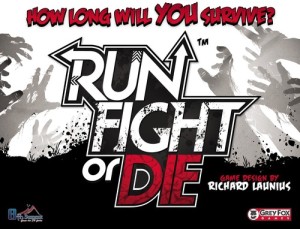 3. Run, Fight, or Die
3. Run, Fight, or Die
This one should come as no surprise to anyone familiar with my enduring need to collect zombie games and my love for anything and everything Richard Launius. Run, Fight, or Die gets to the heart of the zombie genre: survival. Wave after wave of undead are shambling toward you, how do you use your resources to put them down? That’s all. The simplicity is the strength of this game. Because it cuts out all of the upkeep and movement that most zombie games have, it’s easy learn and jump right into the fun of fighting back the horde. It’s a darker theme than your average push your luck dice game, but still humorous. The game incorporates all of your favorite zombie movie tropes, like ‘The Dumb Jock’,‘The Obnoxious Councilman’, and many more. Run, Fight, or Die has tons of replayability with many available expansions and modes of play; it’s tense, exciting, and always a blast! Be sure to listen to our review on Episode 6 of the Podcast.
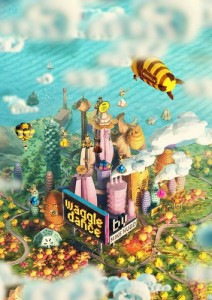 2. Waggle Dance
2. Waggle Dance
Waggle Dance was one of the few kickstarter projects that I felt truly passionate about last year. It had a heck of a turn around, being delivered close to five months after being funded! I don’t know how they managed it, but Grublin Games put together an incredible game in that short time. The artwork by Mateusz Szulik is both stunning and whimsical. I love building up my beehive and collecting the brightly colored cube nectar with my worker bees. While it’s simple enough for newer gamers to learn, there are some difficult strategic choices that make it a challenge for seasoned gamers too. I appreciate that the game requires you to keep track of your opponents’ dice and anticipate what they might be going after in order to place your workers effectively. The interactivity, use of dice as workers, and bidding feel of the nectar collection come together beautifully in this light-hearted Euro!
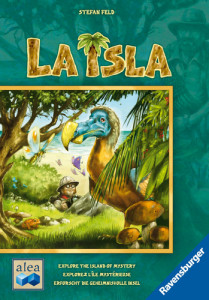 1. La Isla
1. La Isla
Despite being a Stephan Feld fan, when I initially saw La Isla I wanted to hate it. The somewhat garish aesthetic is something I’ve come to expect from Feld, but the plastic explorers took me by surprise. Who puts plastic minis in a Feld?! Rome demands meeples! However, what I discovered after just one play is that there is an amazing tactical game hidden under that oh-so-green exterior! My favorite part is the limited decision tree. La Isla is all about figuring how to capture as many animals as you can with a small resource pool, three special abilities, and your opponents potentially blocking you the whole way. You are continually trying to make the best of a less than ideal situation. The play time is short—around an hour—and it’s easier to teach than your standard Feld. Pair that with the replayability factor of the modular board and La Isla has made it to my table more than any other game!
Honorable Mentions
These are my top 5 games that didn’t make my top 5. I feel compelled to mention these games because I think they are all great and worthy of anyone’s collection. Some I just haven’t played enough or at all the player counts, others I think need some expansion material to fill them out a little more.
Doodle Quest: Arguably more of an activity than a game, but drawing on transparencies is just so unique and plain old fun!
Imperial Settlers: A solid mix of hand management, variable powers, and worker placement in an adorable civilization building package. I only wish I had played it more!
Medieval Academy: A fantastic drafting game that was a complete surprise coming out of Essen. At first glance you wouldn’t think moving markers around different tracks to gain victory points would be fun, but it totally it is!
Pandemic: The Cure: An absolutely perfect distillation of the original game with a higher level of abstraction that makes it faster to teach and play. This one has made it to my table quite often over the past couple of months!
Roll for the Galaxy: Had I gotten it sooner, this one could have been a contender! I’ve played it a bunch at the two-player count and I’m finding that it works brilliantly over Skype. So far, each game has been different and interesting. Roll for the Galaxy is quick and doesn’t suffer from the same unrememberable iconography of it’s predecessor.






